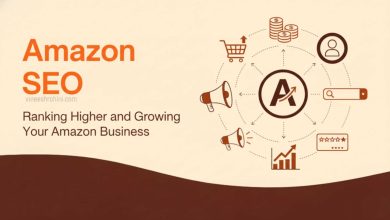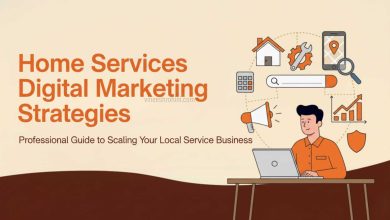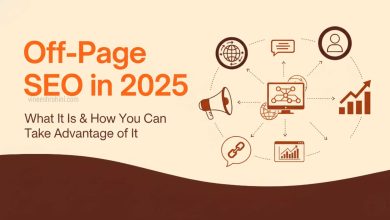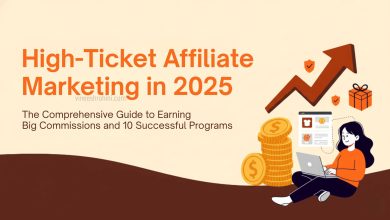How to Use AI in Digital Marketing : Comprehensive Guide 2025
How to Use AI in Digital Marketing : As we step into 2025, Artificial Intelligence (AI) continues to revolutionize the digital marketing world. Once considered a futuristic technology, AI has now become an essential tool for businesses to optimize campaigns, personalize user experiences, improve customer service, and boost conversions.
Table of Contents
In this comprehensive guide, we’ll explore how to use AI in digital marketing, the latest trends, tools, techniques, and strategies to stay ahead in the competitive digital space.
What Is AI in Digital Marketing?
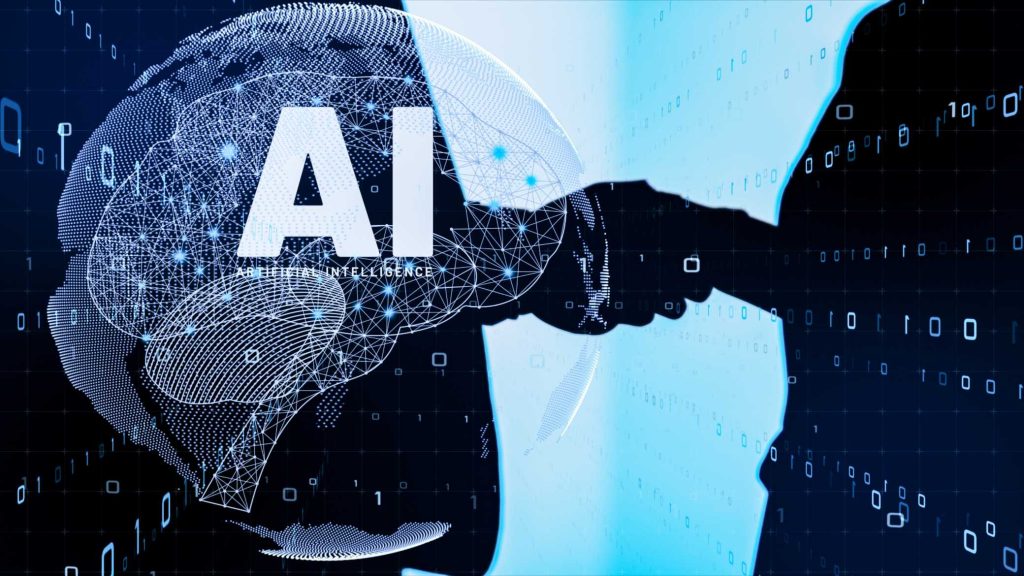
AI in digital marketing refers to the integration of machine learning algorithms, natural language processing (NLP), data analytics, and automation tools into marketing strategies. It allows marketers to make data-driven decisions, automate repetitive tasks, predict consumer behavior, and personalize content at scale. The result? Smarter campaigns, higher ROI, and improved user engagement.
Also Read : How to Create a Powerful Social Media Strategy
Why AI is Crucial in Digital Marketing in 2025
In 2025, consumer behavior is more dynamic than ever. Users expect hyper-personalized content, faster responses, and seamless experiences. Traditional marketing tools are no longer sufficient to handle the massive volumes of data and real-time personalization needs. This is where AI marketing tools step in.
High-Reaching Keywords:
- AI in digital marketing
- Artificial Intelligence marketing tools
- AI-powered marketing
- Predictive marketing analytics
- Personalized marketing automation
Key Applications of AI in Digital Marketing
1. AI-Powered Chatbots & Conversational Marketing
AI chatbots have evolved into sophisticated customer support agents that can handle thousands of queries simultaneously with minimal human intervention.
Benefits:
- 24/7 customer support
- Instant responses
- Personalized conversations using NLP
- Lead generation through intelligent chat funnels
Popular Tools:
- Drift
- ManyChat
- ChatGPT API
- Zendesk AI
2. Predictive Analytics and Customer Insights
AI helps marketers use historical data to predict future behavior, enabling better targeting and content delivery.
Use Cases:
- Forecasting sales and customer churn
- Dynamic pricing optimization
- Predicting the best time to run campaigns
- Segmenting audience by behavior, not just demographics
Tools to Try:
- Adobe Sensei
- Google AI Analytics
- Salesforce Einstein
3. Personalization at Scale
With AI, marketers can customize user experiences for each individual based on browsing history, location, device, past purchases, and more.
Examples:
- Netflix’s recommendation engine
- Amazon’s dynamic product displays
- Personalized email subject lines & product suggestions
AI Platforms for Personalization:
- Dynamic Yield
- Optimizely
- Mailchimp AI
4. AI in Content Creation
AI-powered tools can now generate high-quality content for blogs, ads, product descriptions, and even videos.
Benefits:
- Faster content creation
- SEO optimization
- Real-time adaptation based on performance
Popular AI Content Tools:
- Jasper AI
- Copy.ai
- Writesonic
- ChatGPT for SEO blogs
5. Visual Recognition and Image Tagging
AI can automatically tag, organize, and recommend images or videos based on visual elements.
Used in:
- E-commerce platforms for visual search
- Instagram/Facebook Ads
- Dynamic product showcasing
Tools:
- Google Vision AI
- Amazon Rekognition
- Clarifai
6. Voice Search Optimization
With the rise of voice assistants like Alexa, Siri, and Google Assistant, AI helps marketers optimize content for voice-based search queries.
Strategies:
- Focus on long-tail keywords
- Use natural language structure
- Include featured snippets (Position 0 SEO)
7. AI in Email Marketing
AI-driven email marketing platforms optimize send times, subject lines, and content for higher open rates and conversions.
Key Features:
- Predictive email timing
- Audience segmentation
- A/B testing automation
- Smart recommendations
Tools:
- HubSpot AI
- Moosend
- Brevo (formerly Sendinblue)
Top AI Tools for Digital Marketers in 2025
| Tool Name | Primary Use | AI Feature Highlight |
|---|---|---|
| Jasper AI | Content writing | GPT-based copy generation |
| Surfer SEO | SEO content optimization | SERP data + NLP integration |
| Phrasee | Email & ad copy optimization | Predictive subject lines |
| SEMrush AI | Keyword research & competition | AI traffic insights & clustering |
| Drift | Conversational marketing | Lead qualification & chat personalization |
| ChatGPT | Multi-purpose AI assistant | Prompt-based copywriting and chatbot use |
How to Integrate AI in Your Digital Marketing Strategy
Step 1: Audit Your Current Marketing Process
Identify repetitive tasks that can be automated (e.g., customer queries, email campaigns, reporting).
Step 2: Select the Right AI Tools
Choose tools based on your objectives—be it content creation, lead generation, or personalization.
Step 3: Train Your Team
AI tools require marketers to understand prompt engineering, data handling, and strategic planning.
Step 4: Implement in Phases
Start with smaller tasks like email automation or chatbot integration before scaling to advanced AI analytics.
Step 5: Monitor, Analyze, and Optimize
Use AI-based performance tracking tools to see what’s working. Tweak your approach accordingly.
Real-Life Examples of AI in Action
🛒 E-Commerce (Amazon)
Amazon uses AI to track user behavior, predict purchases, and recommend products in real time.
📰 Media (Buzzfeed)
Buzzfeed uses AI to analyze audience reactions and create content that resonates emotionally.
👗 Fashion (Zara)
Zara uses AI to forecast fashion trends and adjust their supply chain dynamically.
✈️ Travel (Booking.com)
AI personalizes travel suggestions and predicts pricing trends to boost bookings.
Benefits of Using AI in Digital Marketing
- Increased ROI through automation and targeting
- Time savings on content, campaign management
- Real-time customer insights
- Higher customer satisfaction via chatbots and personalization
- Improved conversion rates due to tailored messaging
Challenges and Risks of AI in Digital Marketing
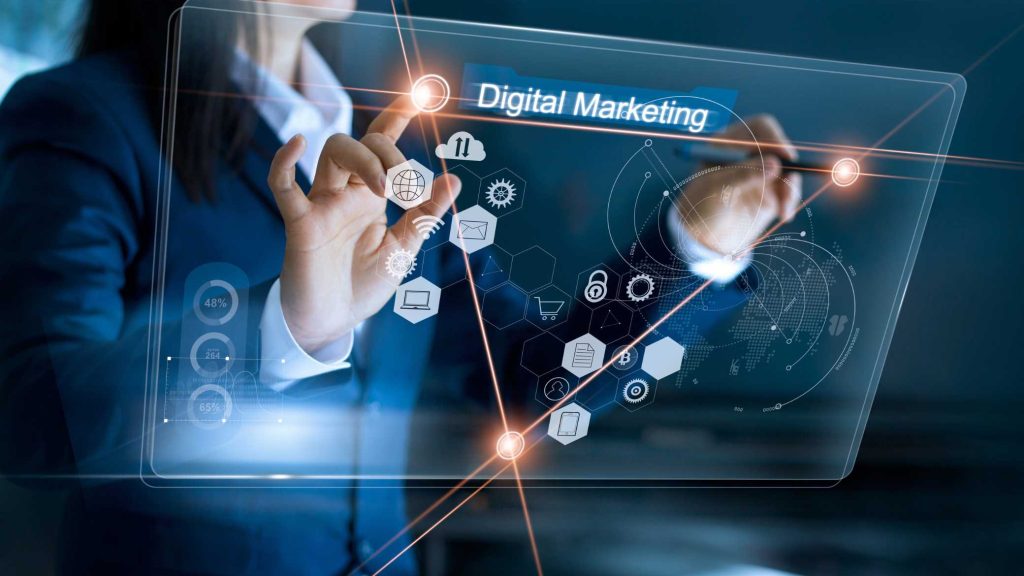
- Data Privacy Concerns – AI systems rely heavily on user data
- Over-Automation – Can lead to loss of human touch
- Learning Curve – Marketers need training to use AI effectively
- Algorithm Bias – Flawed data may lead to incorrect targeting
- Tool Overload – Too many tools can create inefficiency
Future Trends in AI and Digital Marketing (2025 and Beyond)
🔮 Hyper-Personalization
AI will deliver real-time experiences customized to individual behavior, emotions, and preferences.
🎯 Predictive Lead Scoring
AI will improve sales pipeline accuracy by scoring leads based on interaction patterns and purchase intent.
🎥 AI-Generated Videos
Using AI tools like Sora by OpenAI, brands can auto-generate product videos, explainers, or promos.
🤖 Emotion AI
Future campaigns may use AI to analyze facial expressions and tone to adjust marketing messages on the fly.
🔁 Real-Time Dynamic Ad Targeting
AI will deliver different ad creatives to different users based on live behavior and psychographic profiles.
AI in Digital Marketing for Small Businesses
AI is not just for big brands. Small and medium businesses can benefit from:
- Automated email campaigns
- Local SEO optimization using AI tools
- AI-powered chat widgets
- Low-cost content generation
- AI ad copywriting for Facebook/Instagram
Tools for SMBs:
- Pictory.ai (video creation)
- ChatGPT (multi-use)
- Canva AI (design + copy)
- AdCreative.ai (ad design)
SEO and AI – A Perfect Match in 2025
Search engines now use AI to rank pages. Here’s how marketers must adapt:
- Focus on intent-based keywords
- Use tools like Surfer SEO and MarketMuse
- Create topic clusters and semantic-rich content
- Use AI for content gap analysis
Ethical Considerations in AI Marketing
- Transparency – Always disclose if content is AI-generated
- Consent – Get user consent before data tracking
- Bias Management – Regularly audit AI tools for fairness
- Content Authenticity – Avoid deepfakes or misleading AI-generated info
How to Get Started With AI in Digital Marketing (2025)
- Understand Your Goals – Brand awareness, traffic, leads, or sales
- Start Small – Automate one function at a time
- Experiment with Free AI Tools – Try ChatGPT, Canva AI, and Mailchimp’s free tier
- Upskill Continuously – Take AI marketing courses on Coursera, HubSpot Academy, or Google AI
- Stay Updated – Follow AI marketing trends, algorithm updates, and case studies
FAQs on Using AI in Digital Marketing
❓ Is AI replacing digital marketers?
➡️ No, AI augments human marketers by automating tasks and enhancing decisions.
❓ Can AI create blog posts or ads?
➡️ Yes, AI tools like Jasper and Copy.ai can create SEO blogs, ad headlines, and social media posts.
❓ What skills do I need to use AI in marketing?
➡️ Basic understanding of data, prompt writing, and familiarity with AI tools.
❓ Are AI marketing tools expensive?
➡️ Many tools have free tiers, and costs are scalable for small to large businesses.
How to Use AI in Digital Marketing – Conclusion

In 2025, the fusion of AI and digital marketing is no longer optional – it’s essential. Whether you’re a solopreneur, agency, or enterprise, leveraging AI can supercharge your marketing efforts with speed, intelligence, personalization, and scalability. From automated customer interactions to real-time content generation and deep predictive analytics, AI empowers marketers to deliver better results than ever before.
Buy Now : Ecommerce Website
Adopt AI smartly, ethically, and strategically – and you’ll not only stay relevant but dominate the digital space.
Disclaimer : This guide is for educational purposes and does not substitute professional consultation. Always test AI tools before full-scale implementation and ensure compliance with local data protection laws.
Keywords : How to Use AI in Digital Marketing – How to Use AI in Digital Marketing 2025 – How to Use AI in Digital Marketing Guide
